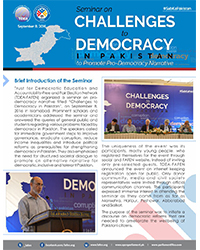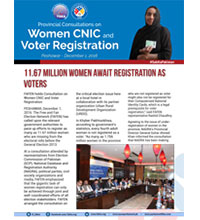ISLAMABAD, September 8, 2016: Speakers at a seminar called for immediate government steps to improve governance, eradicate corruption, reduce income inequalities and introduce political reforms as prerequisites for strengthening democracy in Pakistan.
The seminar titled “Challenges to Democracy in Pakistan” was held under the aegis of Trust for Democratic Education and Accountability-Free and Fair Election Network (TDEA-FAFEN) and was addressed by renowned scholars and academicians. The purpose of the seminar was to initiate a discourse on democratic reforms that are needed to ameliorate the wellbeing of Pakistani citizens.
At the outset of the seminar, a TDEA-FAFEN representative Rashid Chaudhry presented the findings of socio-political survey of National Assembly constituencies undertaken by the organization in February 2016. According to the survey, only 46 percent of the people said they wanted democracy as their choicest form of the government. As many as 18 percent of the people said they wanted military to take direct control over the government. The rest named other forms of governments such as Khilafat, a public welfare government, etc.
Renowned journalist and Chairperson of the TDEA Board of Trustees M. Ziauddin talked about various crisis of governance. He said constitutional supremacy, equal distribution of resources, and strong writ of the government are vital to combat corruption-like challenges in Pakistan. The main reason for the crisis of governance in the country is the personalization of matters instead of institutionalization. He regretted that even after two general elections, Pakistan does not have a sustainable local governance system.
Former Finance Minister Dr. Salman Shah, while talking on “Corruption: An Unbridled Scourge”, said Pakistan ranks 150th in terms of per capita income and 147th in the terms of Human Development Index. He said the country’s bureaucracy is the worst, criticizing the “Sifarish” system that is in vogue in all spheres of public affairs.
He said the country needed three million new jobs every year. He asserted the real cause of corruption in Pakistan was that nobody cared for laws of conflict of interest, which are yet to be defined. The concept is totally alien to Pakistan.
Prof. Dr. Muhammad Waseem, while talking about “Democracy: Two Alternative Narratives in Pakistan”, said the middle class was a stable constituency for military rule in Pakistan, as it thinks that the political class is ineffective. Unfortunately, our democracy is a method for elite to get itself elected to power. He said Pakistan was in the state of paranoia, living in the fear of outer forces. The elite in Pakistan have been afraid of democracy and thought of election as their political death in the early years, which laid a wrong foundation. 
He said political parties in Pakistan are ‘Leader Parties’. People look for a charismatic leader, not an ideology. This is not how institutions or structures develop, he explained. He said corruption is not a religious or a moral issue rather a structural issue. “We need to understand it as such in order to curb it,” he said.
PATTAN’s National Coordinator Sarwar Bari, while talking on “Growing Inequalities: Woes of the Working Classes in Pakistan”, said there is a myth that economic growth is trickled down to the poor, decreasing inequality. It may happen elsewhere, it has not happened in South Asia.
In the last decade, the tax burden on the poor has increased by 35% while the rich pay virtually no tax on their income. He said Pakistan has the highest rate of still birth and first day deaths in the world. Eighty percent of the candidates on peasant and laborer seats of local government elections have declared themselves as businessmen on their nomination papers and yet their nominations were not rejected by the respective Returning Officers.
He said political parties are strengthening parochialism and identities such as biradris, caste, sect, etc. The intelligentsia in every country is part of some larger movement, but in Pakistan, they are working individually, crying hoarse from the comfort of their homes. He said the political elite has successfully disconnected the political society from civil society and trade unions.
TDEA Chief Executive Officer Shahid Fiaz said that Pakistan lacked a multi-dimensional discourse on democracy and challenges it faced. He said that governance crises had direct impact on the life and well-being of citizens especially those living on margins. He stressed the need for structured societal dialogue to promote a pro-democracy, inclusion and tolerance narrative. He said that TDEA-FAFEN was initiating this discourse. He announced the establishment of a think tank called Democracy Pakistan Forum (DPF) comprising leading national figures that will lead the democratic discourse in the country.
To download Urdu Press Release, click here


